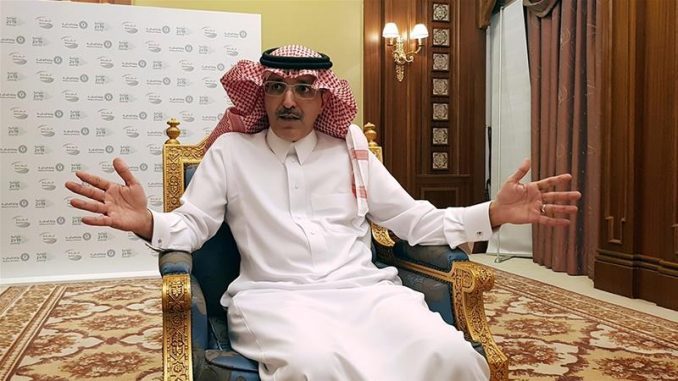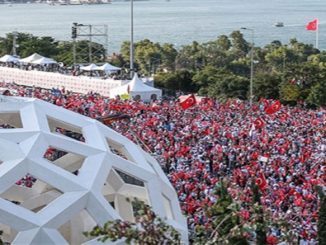
Saudi Arabia’s spending cuts come amid a plunge in oil prices, hurting the government’s finances.
Saudi Arabia will triple its value added tax rate and suspend a cost-of-living allowance for state employees, the kingdom’s finance minister said on Monday, seeking to shore up finances hit hard by low oil prices and a coronavirus-driven slowdown.
“The cost of living allowance will be suspended as of June 1, and the value added tax will be increased to 15 percent from 5 percent as of July 1,” Finance Minister Mohammed al-Jadaan said in the statement reported by the state news agency.
“These measures are painful but necessary to maintain financial and economic stability over the medium to long term … and to overcome the unprecedented coronavirus crisis with the least damage possible.”
In 2018, Saudi Arabia’s King Salman ordered a monthly payment of 1,000 riyals ($267) to every state employee to compensate them for the rising cost of living after the government hiked domestic gas prices and introduced value-added tax.
About 1.5 million Saudis are employed in the government sector, according to official figures released in December.
The world’s largest oil exporter is suffering from slumping prices, while at the same time measures to fight the new coronavirus are likely to curb the pace and scale of economic reforms launched by Crown Prince Mohammed bin Salman (MBS).
The austerity measures being introduced come after the kingdom posted a $9bn budget deficit in the first quarter.
The finance minister said non-oil revenues were affected by the suspension and decline in economic activity, while spending had risen due to unplanned strains on the healthcare sector and the initiatives taken to support the economy.
“All these challenges have cut state revenues, pressured public finances to a level that is hard to deal with going forward without affecting the overall economy in the medium to long term, which requires more spending cuts and measures to support non-oil revenues stability,” he added.
The central bank’s foreign reserves fell in March at their fastest rate in at least 20 years and to their lowest since 2011.
Oil revenues in the first three months of the year fell 24 percent from a year earlier to $34bn, pulling total revenues down 22 percent.
“The economy of Saudi Arabia has been under a lot of stress. That’s why the government withdrew $23bn from the reserve in March. This is the largest withdrawal from the reserve, ever, in the history of the country,” Ali al-Ahmed, a Saudi scholar and expert on Saudi political affairs at the Institute for Gulf Affairs in Washington, DC, told Al Jazeera.
The government has canceled and put on hold some operating and capital expenditures for some government agencies, and cut allocations for a number of its Vision 2030 reform program’s initiatives and mega projects with a total value of 100bn riyals ($26.6bn), according to the statement.
In March, sources told Reuters that the government had asked state agencies to submit proposals for cuts of at least 20 percent to their budgets.
A committee has been formed to study all financial benefits paid to public sector employees and contractors, and will submit recommendations within 30 days, the statement said.
In late 2015, when oil prices collapsed from record highs, the kingdom took a number of strict austerity measures, including slashing lavish bonuses, overtime payments and other benefits that were once considered routine perks in the public sector.
In a country that has no elections and where political legitimacy rests partly on distribution of oil revenue, the ability of citizens to adapt to reforms aimed at reducing oil dependence and improving self-reliance is crucial for stability.
Earlier on Monday, Saudi Aramco said it was slashing domestic gasoline prices for May, effective immediately, with the price of 91 grade dropping to 0.67 riyals from 1.31 riyals and 95 grade to 0.82 riyals from 1.46 per litre.
On Twitter, a social media platform favoured by government supporters, many Saudis appeared prepared to accept austerity measures, posting pictures of MBS and pledging their support.
“This crisis will pass soon, and we must stand with our leaders in these difficult days, we trust you,” said a Saudi with a twitter handle Abdullah Althaqafi.
Moody’s devalues Saudi debt
The credit ratings agency early April cut its outlook for sovereigns and companies in Saudi Arabia, the Arab world’s biggest economy.
The fallout of the coronavirus and oil-price collapse will offer a once-in-a decade opportunity for distressed debt investors in the Persian Gulf, according to Sancta Capital Group Ltd.
“2020 will present us with the most lucrative deep value and distressed debt investment opportunity set since the global financial crisis,” Chief Executive Officer Ahmad Alanani said in an interview in Dubai. “We have been refining an extensive target list of credits and equities in which to invest opportunistically and we expect that list to continue to grow.”
The retail, healthcare, education and real estate sectors will offer the most opportunities, he said. Sancta Capital invests in the debt and equity of under-performing corporates.
The coronavirus is triggering waves of corporate stress and credit rating downgrades as multiple countries enforce nationwide lockdowns. Many distressed assets funds across the globe have been raising additional cash from investors to buy debt of indebted companies that are struggling because of the economic fallout of the corona virus.
The oil-rich Persian Gulf is facing a prolonged downturn as the pandemic and a historic crash in oil prices add to pressure on already strained finances. Moody’s Investors Service has cut its outlook and ratings for sovereigns and companies from Saudi Arabia, the Arab world’s biggest economy, to Emaar Properties PJSC, one of the region’s largest listed developers, and port operator DP World.
The region is likely to go through a fresh wave of corporate restructuring, especially in sectors with overcapacity such as tourism, hospitality, and entertainment, according to Sancta Capital’s Chief Investment Officer Gus Chehayeb.
“Fear, panic selling, and economic contraction will eventually make way for bargain hunting, asset reflation, and economic recovery,” he said.
Sancta Capital recently bought bonds in major regional retail and real estate companies, which are trading at “bargain prices,” Alanani said. The company also plans to buy the debt obligations of educational firms and hotel operators that may be forced to restructure.
On top of the impact of low oil prices and the virus, Gulf companies are facing other challenges, which offer opportunities for distressed debt investors. Developers such as Emaar have been hit by a drawn-out property slump, while the United Arab Emirates’ largest hospital operator, NMC Health Plc, was last month placed in administration following allegations of fraud, leaving creditors with $6.6 billion in unpaid debt.
Sancta Capital, which has offices in Houston and Dubai, has $130 million of assets under management in mainly the U.A.E., Kuwait, Egypt and Saudi Arabia.



